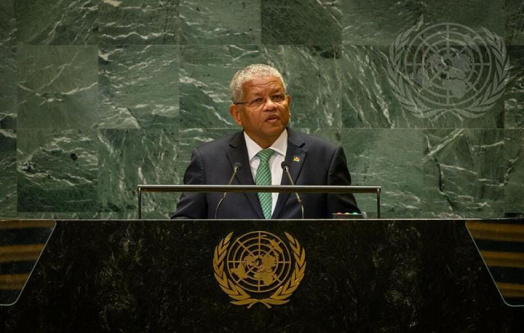
New York, 25th September 2024 – Addressing the 79th United Nations General Assembly (UNGA), President Wavel Ramkalawan of Seychelles urged global leaders to move beyond mere discussion and to enact in tangible reforms. Speaking during the second day of the General Debate, President Ramkalawan highlighted pressing global challenges such as peace and security, climate change, and economic inequality, with a particular focus on the unique vulnerabilities faced by Small Island Developing States (SIDS) like Seychelles.
The session, themed “Leaving no one behind: Acting together for the advancement of peace, sustainable development and human dignity for present and future generations,” was officially opened on Tuesday, following the Future Summit. President Ramkalawan emphasized the need for honest self-reflection among world leaders, urging them to critically assess their efforts in serving their populations and addressing the most urgent challenges of today.
“We must be frank,” he stated, underscoring the importance of being candid about the shortcomings in current global efforts. “For my people of Seychelles, we must be critical of our approach to today’s challenges and plan for those of tomorrow."
President Ramkalawan lamented the increasing insecurity worldwide, pointing out that global conflicts and growing distrust have further destabilized regions that have no stake in these disputes. “The world is less secure than even just a year ago. Flames stoked by competition and distrust threaten to engulf those uninvolved in these conflicts.”
He called for a return to foundational principles of dialogue and cooperation, stressing that without these, there can be no lasting peace or progress. “We cannot build our vision of a peaceful, prosperous, and sustainable world without a stable foundation.”
On the climate crisis, President Ramkalawan reiterated the urgent need for global action, highlighting that SIDS like Seychelles are on the front lines of the battle. “Rising sea levels, extreme weather events, and ocean degradation are stark reminders of the urgent need for collective global action,” he said.
He also addressed the economic constraints hindering the development of SIDS, especially regarding the high debt-to-GDP ratios that stifle critical investments in infrastructure, education, and healthcare. “Ambitious development strategies are meaningless without accessible and sustainable financing,” he noted, pointing out that many vulnerable countries are penalized by high borrowing costs.
President Ramkalawan ended his speech by calling for substantial reforms in the international financial system, emphasizing that vulnerability, rather than income status, should determine access to development resources. “It is time to move beyond discussion and implement real reforms,” he concluded, urging leaders to make meaningful changes to address global inequities.
-End-
